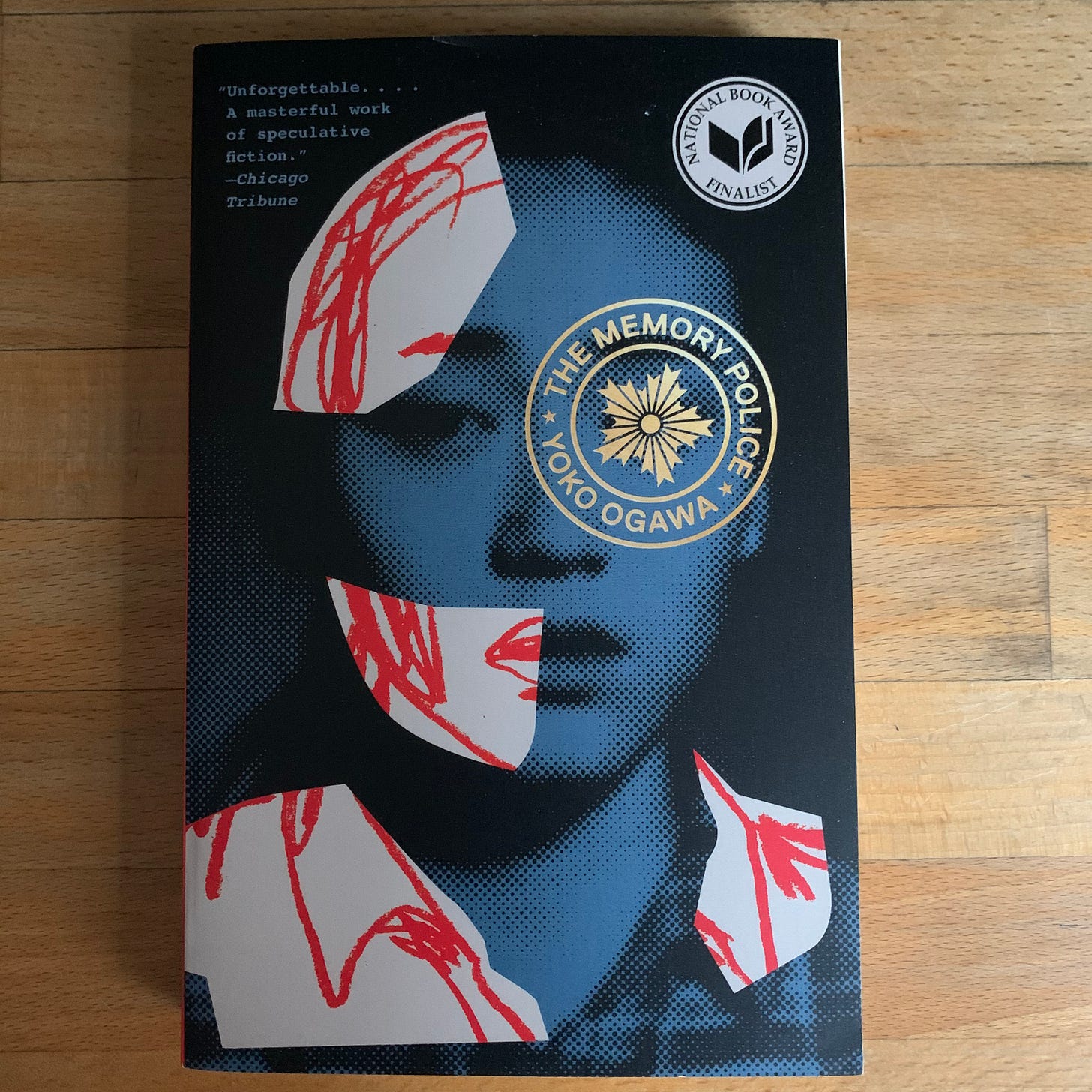'The Memory Police' by Yoko Ogawa
'A heart has no shape, no limits. That's why you can put almost any kind of thing in it, why it can hold so much.' — Review #144

In Yoko Ogawa’s recently translated 1994 novel, there is an island where stuff disappears. Not individual items, but entire categories of things vanish and are forgotten like they never existed in the first place. Birds: gone. Roses: petals blown away in the wind or washed out to sea, bushes never to bloom again. It’s unclear who decides what will disappear, but enforcement is handled by the Memory Police. When photographs are to disappear, the mysterious and thuggish Memory Police ensure residents burn them all. Ditto calendars. And novels. Anyone who tries to hold onto a disappeared item—the Memory Police ransack homes looking for such contraband—is taken away to an unknown fate. To survive on this island, one must comply and forget. Here’s the cover:

If you enjoy this review, click the ♥️ above or
An unnamed woman lives alone in the house she grew up in and writes novels. Her father, an ornithologist, died after birds disappeared. Her mother, a sculptor, died in the custody of the Memory Police; she was one of a minority of people who are unable to forget things. One day the woman hears a knock on the back door, and discovers family friends who are going into hiding. They wanted to return some of her mother’s sculptures before taking refuge in a safe house. This inspires the woman to save her editor, who also cannot forget things, because she cannot write her latest novel without his guidance. She recruits her one friend, an old man who piloted a ferry before they disappeared and has since become a security guard and handyman, to help her rig a crawlspace under her floor into a habitable room for the editor, named R. The woman knows that R’s presence is the one thing that might prevent her from:

‘The Memory Police’ is about loss and the complex and myriad ways we experience it. When someone close dies, or we fall out of touch with a friend, or we lose a job, or we grow too old to do something, we feel that absence intensely. But over time, it fades. We keep photographs, diaries and other mementos to slow this process, but we each have our own memory police inside of us that causes our remembrances to gradually disappear. The book seems to ask whether it’s better to hold on to these memories, and the emotions associated with them, or to let them go. I don’t think there’s a right answer. But the book has me thinking about life inside my head. I am outspoken in my disdain for nostalgia. My three least-favorite words are ‘I used to,’ and I think this is because deep down I miss the past. The two ways I deal with that are collecting things like books and Star Wars memorabilia, but also by employing my own memory police to suppress yearnings for yesteryear. For example, my father texted me this week that it was the 26th anniversary of my grandmother’s death. I paused a moment to look at the photograph of her I put up after reading ‘Italian Folk Magic,’ and then put the anniversary out of my mind. Not because I don’t love or miss my grandmother. But because I do. ‘The Memory Police’ has forced me to think about this and other ways I’ve processed loss, grief and memory. Since I’ve finished it, I’ve spent some time in:

Back on the island, snowfall blankets everything. Eventually, people’s limbs disappear. I won’t give away how it ends, but I will say that the book is not completely bleak. The interaction among the woman, the old man and R is great, and gives you reason to hope. I loved when they discovered that the woman’s mother hid disappeared items, and how R encouraged the woman and the old man to touch the objects to trigger their memories. I loved the woman and R’s working relationship (we read her manuscript about a typist who loses the ability to type), and how the book is a low-key love letter to editors (I would be nowhere without Donna’s guidance on these reviews!). And I was riveted when the Memory Police stormed the woman’s house looking for disappeared things, and she couldn’t stop staring at the turned-up corner of the rug covering the trap door to R’s hiding place. I was like:

I enjoyed the book, and I’m glad I read it. The writing is direct and intense, and I flew through it. If you’re in a good place emotionally, you should read it.
How it begins:
I sometimes wonder what was disappeared first—among all the things that have vanished from the island.
“Long ago, before you were born, there were many more things here,” my mother used to tell me when I was still a child. “Transparent things, fragrant things … fluttery ones, bright ones … wonderful things you can’t possibly imagine."
“It’s a shame that the people who live here haven’t been able to hold such marvelous things in their hearts and minds, but that’s just the way it is on this island. Things go on disappearing, one by one. It won’t be long now,” she added. “You’ll see for yourself. Something will disappear from your life.”
“Is it scary?” I asked her, suddenly anxious.
“No, don’t worry. It doesn’t hurt, and you won’t even be particularly sad. One morning you’ll simply wake up and it will be over, before you’ve even realized. Lying still, eyes closed, ears pricked, trying to sense the flow of the morning air, you’ll feel that something has changed from the night before, and you’ll know that you’ve lost something, that something has been disappeared from the island.”
My rating:

‘The Memory Police’ (Hisoyaka na kesshō) by Yoko Ogawa was originally published by Kodansha, Ltd., in 1994. It was translated from the Japanese by Stephen Snyder and published by Pantheon Books in 2019. It was published by Vintage Books in 2020. 274 pages. $14.72 on Bookshop.org.
Up next:
It’s Novella November again! Here’s an Instagram post featuring the lineup:
Review #143: ‘The Road’ by Cormac McCarthy
Support BoG: Twitter | Instagram | Goodreads
Contact me: booksongif@gmail.com.
Before you go:
Read these: A few things I read this week that are worth your time: ‘My Mustache, My Self’ by Wesley Morris in The New York Times Magazine is a fascinating meditation on facial hair, identity and blackness; ‘Fred and Me’ by Sara Benincasa in Human Parts on Medium is a great piece on love, mental health and Frederick Law Olmsted; and ‘How We Lie to Ourselves About History’ by Rachel Syme in The New Yorker is about one of my favorite podcasts, the excellent ‘You’re Wrong About’ (thanks, Danielle, for putting me onto it!) that reconsiders ‘a person or event that's been miscast in the public imagination.’
Look at this: Marjane Satrapi, the artist and illustrator who created ‘Persepolis,’ which I reviewed a million years ago, has an exhibition of paintings of women in Paris this month. This Literary Hub article shows some of Satrapi’s work.
Do this: As the holidays approach, here is a friendly reminder to support local and independent book stores, many of which are struggling to make ends meet right now. The New York Times published this piece that includes this stat: ‘According to the American Booksellers Association … more than one independent bookstore has closed each week since the pandemic began.’ For a first-hand take, Harvard Book Store, one of my favorite places to visit and shop, wrote this compelling Twitter thread about their plight to keep employees safe—and paid—amid the pandemic. I’ve been doing my part when I can, ordering from BookShop.org and Alibris. Support independent book stores!
Thanks for reading, and thanks especially to Donna for editing this newsletter!
Until next time,

MPV
Review #144 used GIFs from @drawingintheforest and @maremonstrum via Giphy.com.
Books on GIF newsletters with most ♥️s




